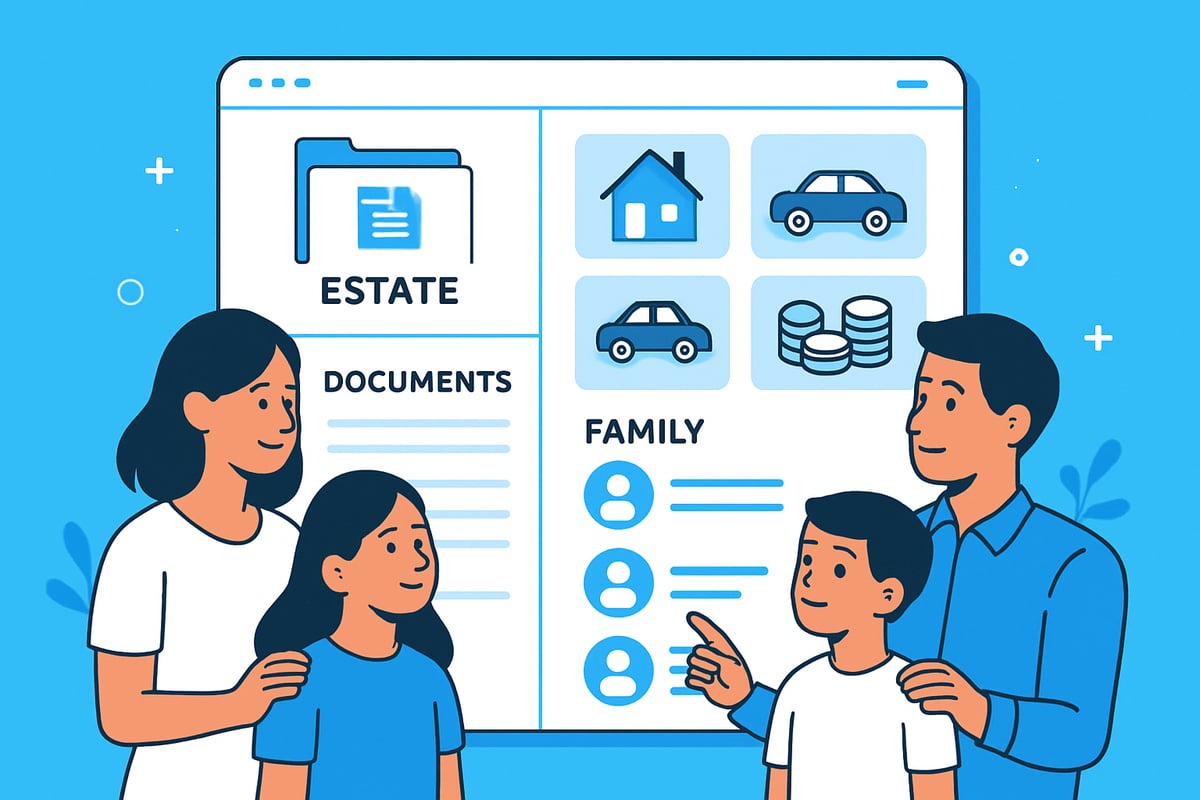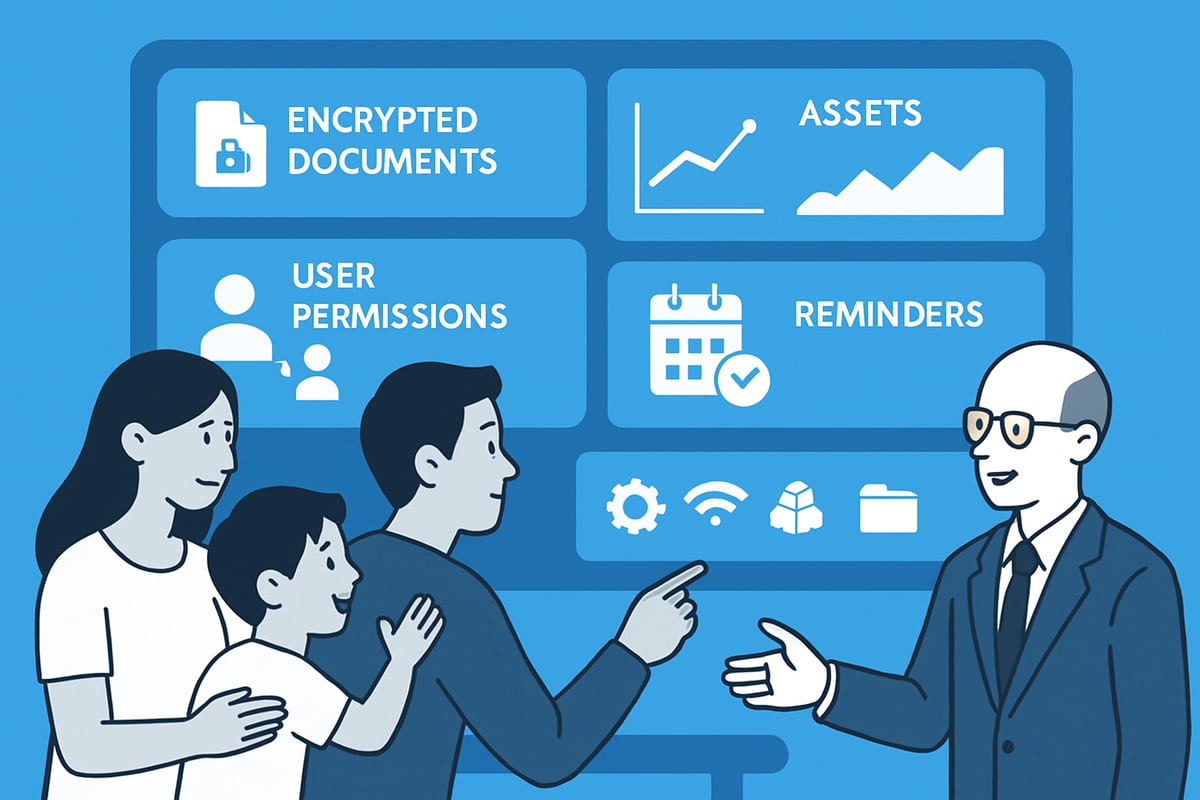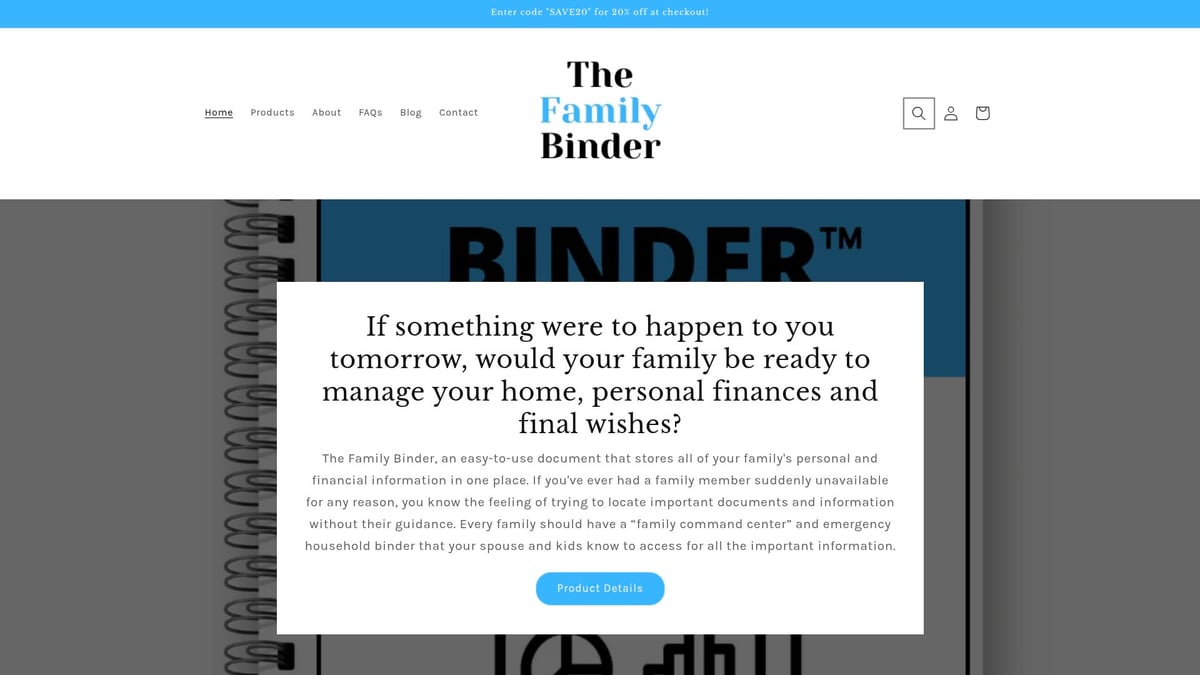Imagine a future where every detail of your estate is perfectly organized and always accessible. No more confusion, missed documents, or family stress—just peace of mind. This guide is your 2025 blueprint for mastering an estate management system, giving you the confidence that your assets and wishes are fully protected.
We will explore what an estate management system is, how to choose and set one up, the must-have features for 2025, and best practices for security and compliance. Get ready to take control, reduce stress, and empower your loved ones with a step-by-step approach.
Understanding Estate Management Systems
Imagine trying to organize a puzzle with missing pieces. That’s what estate planning can feel like without a clear system. A modern estate management system brings order to the chaos, giving you a structured way to secure your legacy and protect your loved ones.

What is an Estate Management System?
An estate management system is a comprehensive platform designed to organize, store, and update all aspects of your estate. Its core purpose is to gather your assets, legal documents, and key contacts in one secure place. Unlike traditional estate planning, which often relies on stacks of paper and scattered files, a digital estate management system streamlines everything for easy access and management.
Key components include:
- Asset inventories (real estate, bank accounts, investments)
- Legal documents (wills, trusts, powers of attorney)
- Important contacts (family, executors, advisors)
For a deeper dive into how digital systems differ from traditional approaches, see The Family Binder vs. Traditional Estate Planning. Today’s platforms offer features that paper-based systems simply can’t match.
Why Estate Management Matters in 2025
In 2025, the importance of an estate management system has never been greater. The rise of digital assets—think online accounts, cryptocurrencies, and cloud storage—means more complexity to track and secure. Families are more mobile, with blended households and loved ones often living far apart.
Legal and regulatory changes also demand more careful planning. Did you know that 67% of adults still lack a comprehensive estate plan, according to a 2023 survey? Poor estate management can leave families facing confusion, legal delays, and even financial loss.
Core Benefits of a Modern Estate Management System
A modern estate management system offers several crucial benefits. First, it centralizes every detail, reducing the risk of lost or overlooked assets. Enhanced security features protect your sensitive information from unauthorized access.
Communication between executors, beneficiaries, and advisors becomes seamless, ensuring everyone is on the same page. Digital systems can even cut estate settlement timelines by up to 50%, making the process smoother for your loved ones. The peace of mind that comes from knowing everything is organized is priceless.
Common Challenges Without a System
Without an estate management system, families often face missing documents, overlooked assets, and incomplete information. These gaps can spark family disputes, create confusion, and lead to legal delays or extra costs.
During emergencies or incapacity, the lack of organization adds unnecessary stress for everyone involved. Real-life cases show that probate can drag on for months or even years simply because the estate was disorganized. The result? Families are left waiting, sometimes with critical needs unmet.
Who Needs an Estate Management System?
Who should consider an estate management system? The answer is almost everyone, especially:
- Families with dependents or aging parents
- High-net-worth individuals
- Business owners with complex assets
- Anyone holding digital assets or online accounts
Recent trends show that 40% of millennials are now seeking estate management tools, recognizing the advantages of digital solutions for their future. Regardless of age or wealth, anyone aiming for peace of mind and efficient estate handling can benefit.
Key Features & Must-Have Tools for 2025
Staying ahead with the right estate management system means knowing what features matter most in 2025. Today’s systems offer a suite of tools built to protect your information, support your family, and simplify complex tasks. Let’s break down the must-have features that make a modern estate management system both powerful and user-friendly.

Digital Document Storage & Encryption
A robust estate management system starts with secure digital document storage. Cloud-based repositories protect your wills, trusts, insurance policies, and other vital records from loss or damage. Leading platforms use multi-factor authentication and end-to-end encryption, such as 256-bit standards, to safeguard sensitive files.
With the rise of digital assets, choosing a system that keeps your data private is essential. Audit trails track who accesses documents, adding another layer of protection. For families seeking best practices, Digital Estate Planning Best Practices offers practical tips for organizing and securing estate documents digitally.
Modern systems let you scan, upload, and organize paperwork with just a few clicks. This means your estate management system is always up-to-date and accessible when needed.
Automated Asset Tracking & Updates
Asset tracking is now automated in any leading estate management system. Integration with banks and investment accounts allows real-time updates on valuations, so you always know your net worth. Notifications alert you to significant changes or required actions, reducing the risk of missed details.
Consider a system that syncs with your financial institutions. This ensures your estate management system reflects your true financial picture at all times. Automatic syncing also helps you spot discrepancies or forgotten assets, streamlining the process for you and your future executor.
Automated tracking reduces manual work and minimizes errors. Your estate management system keeps everything organized, so you can focus on your family and goals.
Collaboration & Access Controls
Collaboration tools are essential in a modern estate management system. Role-based permissions allow you to grant access to family members, executors, and advisors, ensuring only the right people see sensitive information. Emergency access features guarantee that crucial details are available when needed most.
Platforms offer audit trails that log every change or document view. This transparency builds trust among stakeholders. You can even grant temporary access to attorneys or accountants for specific tasks, keeping your estate management system secure yet flexible.
Having clear access controls reduces confusion and prevents unauthorized access. Collaboration features make sharing information simple, supporting seamless teamwork during critical times.
Task Management & Reminders
A comprehensive estate management system includes built-in task management. Checklists guide you through key milestones, from updating beneficiaries to reviewing insurance policies. Automated reminders help you stay on top of deadlines, like document renewals or annual reviews.
Shared task lists are invaluable for co-executors or family members managing responsibilities together. Research shows systems with reminders reduce missed deadlines by 30 percent, easing stress during already challenging times.
Your estate management system should make it easy to assign, track, and complete tasks. Keeping everyone on the same page ensures nothing falls through the cracks when it matters most.
Integration with Legal and Financial Services
The best estate management system seamlessly connects with your broader support team. E-signature capabilities let you execute legal documents securely from anywhere. Direct links to attorneys, CPAs, and financial advisors streamline collaboration and data sharing.
Look for platforms that allow you to import and export data for tax filings or legal reviews. This integration saves time and reduces errors, ensuring your estate management system works hand-in-hand with your professional advisors.
These features make handling complex estates more manageable. By choosing a system with strong integration tools, you set your family up for a smoother, more confident future.
Step-by-Step Guide: Setting Up Your Estate Management System
Setting up an estate management system may seem daunting, but breaking it into clear steps makes the process manageable and rewarding. Follow this guide to ensure every detail of your estate is organized, secure, and accessible when it matters most.

Step 1: Inventory All Assets & Liabilities
Begin by listing every asset and liability you own. This means real estate, bank accounts, investments, retirement funds, insurance policies, and digital assets like cryptocurrency or online accounts. Do not forget debts such as mortgages, loans, or credit cards.
Use a spreadsheet or asset inventory template to keep things organized. Many estate management system platforms offer built-in checklists, making this step easier. For more guidance, the Estate Planning Guide for Families offers a detailed breakdown of what to include.
Keep your list updated as your financial situation changes. This foundational inventory ensures your estate management system starts with a clear picture.
Step 2: Gather and Digitize Essential Documents
Next, collect all vital documents. These often include wills, trusts, powers of attorney, insurance policies, property deeds, titles, and personal identification like birth or marriage certificates.
Scan each document and save digital copies in your estate management system. Use high-resolution scans and label files clearly for easy retrieval. Many platforms provide secure document storage and even suggest best practices for scanning.
Keeping digital versions ensures your records are accessible at any time, from anywhere. This step reduces the risk of lost paperwork and supports a seamless transition for your loved ones.
Step 3: Choose the Right Estate Management Platform
With your information gathered, evaluate estate management system platforms. Focus on features like security, usability, customer support, and pricing. Compare options such as Everplans or Trustworthy, and look for platforms that offer free trials or demo versions.
Read user reviews and check industry ratings. A good estate management system should fit your technical comfort level and provide strong customer support.
Choosing the right platform sets the foundation for secure and efficient estate management, so take your time with this important decision.
Step 4: Set Up Access Controls & Permissions
Now, define who can access what within your estate management system. Assign roles for family members, executors, and advisors. Set permissions based on each person’s responsibilities.
Many systems offer emergency access protocols, allowing temporary access in urgent situations. Schedule regular reviews to update permissions as your circle of trusted contacts changes.
A structured permission workflow protects sensitive information and ensures only the right people have access when it counts.
Step 5: Schedule Regular Reviews & Updates
Your estate management system is not a one-time setup. Schedule annual or biannual reviews to keep everything current. Life changes such as marriages, births, divorces, or new assets should prompt immediate updates.
Set reminders within the system for policy renewals, document reviews, and important dates. Many platforms offer calendar integration, making it simple to stay on top of these tasks.
Regular reviews ensure your estate management system always reflects your current wishes and situation.
Step 6: Communicate Your Plan to Key Stakeholders
Finally, share your estate management system setup with those who need to know. Hold family meetings to explain the system and walk through access instructions with executors and advisors.
Provide emergency contact lists and ensure everyone knows how to locate essential information in a crisis. Use communication scripts for sensitive discussions and encourage questions.
Clear communication prevents confusion, builds trust, and empowers your loved ones to act confidently when needed.
Best Practices for Security, Privacy & Compliance
Protecting your estate management system requires a proactive approach to security, privacy, and compliance. With sensitive information at stake, following best practices ensures your assets and wishes remain safe, organized, and accessible only to those you trust.
Data Security Protocols
Every estate management system must prioritize robust data security. Storing wills, financial records, and personal documents in secure, encrypted environments is essential.
Implement these protocols:
- Use encrypted cloud storage with 256-bit encryption.
- Require multi-factor authentication for all users.
- Regularly run vulnerability assessments and software updates.
For added safety, choose platforms with compliance certifications such as SOC 2 or ISO 27001. These standards help ensure your estate management system meets industry benchmarks for security and reliability. Always verify that your chosen system offers audit logs to track access and modifications, providing transparency for your family and advisors.
Privacy & Confidentiality Measures
Safeguarding privacy within your estate management system means restricting access to only those you authorize. Limit permissions so sensitive documents are only visible to essential parties.
Consider these privacy measures:
- Assign role-based permissions for executors, attorneys, and beneficiaries.
- Use secure document sharing tools with expiration dates.
- Ensure the platform aligns with regulations like GDPR or CCPA.
Monitor data access with audit trails, which record who viewed or changed information. This level of oversight not only builds trust but provides a clear record in case of disputes. Keeping privacy at the forefront protects both your legacy and your loved ones’ peace of mind.
Legal and Regulatory Compliance
Compliance is crucial for any estate management system, especially as laws evolve. Make sure your system supports legal requirements at both state and federal levels.
| Requirement | Why It Matters | Estate System Feature |
|---|---|---|
| Digital Signatures | Legal validity of documents | E-signature integration |
| Notarized Storage | Acceptance in probate court | Secure, tamper-evident repositories |
| State/Federal Laws | Legal enforceability | Regular compliance updates |
Keep a checklist of legal requirements, and consult your attorney to verify your estate management system aligns with current estate planning laws. This proactive approach helps avoid costly errors and delays for your heirs.
Disaster Recovery & Backup Strategies
A reliable estate management system includes strong disaster recovery and backup plans. Unexpected events—hardware failures, cyberattacks, or natural disasters—can threaten your information.
Best practices include:
- Schedule automatic backups to multiple secure locations.
- Test backup integrity regularly to ensure data is recoverable.
- Develop a recovery plan outlining steps for restoring access after a breach or loss.
For example, a simple backup script might look like:
rsync -av /estate-documents /secure-backup-location
By preparing for the unexpected, you ensure your estate management system remains a trustworthy foundation for your legacy.
Choosing the Right Estate Management Solution for Your Needs
Selecting the best estate management system for your unique situation is crucial for long-term peace of mind. The right solution should match your estate’s complexity, provide robust tools, and integrate smoothly with your professional support network. Let’s break down the process into manageable steps so you can confidently make your choice.
Assessing Your Estate’s Complexity
Before choosing an estate management system, start by evaluating the complexity of your estate. Consider factors like the number of asset types you own, your family structure, and whether you have business interests. For example, a single person with a home and savings might need a much simpler solution than a blended family with multiple properties or business holdings.
Here’s a quick guide:
- Simple Estate: Few assets, basic family structure, no business interests.
- Complex Estate: Multiple asset types, trusts, business ownership, international holdings.
If you’re unsure, remember that even a straightforward estate can become complicated over time. The estate management system you select should offer flexibility to grow with your needs.
Comparing Leading Estate Management Platforms
Once you know your needs, compare top estate management system platforms based on essential features. Focus on security, usability, customer support, and price. Many solutions offer free trials or demo accounts, which can help you test drive the interface.
| Feature | Platform A | Platform B | Platform C |
|---|---|---|---|
| Security | ✔️ | ✔️ | ✔️ |
| Usability | ✔️ | ✔️ | ✔️ |
| Support | ✔️ | ✔️ | ✔️ |
| Price | $$ | $$$ | $ |
Read user reviews from 2024 to see real-world feedback. The best estate management system balances cost with features that matter most to your family.
Role of Professional Advisors
Professional advisors play a key role in the estate management system process. Attorneys, CPAs, and financial planners help you navigate legal, tax, and financial considerations. Many digital platforms allow secure collaboration with these experts, enabling them to review, update, or witness documents as needed.
Ask yourself:
- When should I bring in legal or financial experts?
- Can my advisors access my chosen estate management system securely?
Building a trusted team ensures your estate plan is both compliant and comprehensive, especially as your assets grow or laws change.
The Family Binder: Organize Your Estate the Smart Way
For families seeking a user-friendly estate management system, The Family Binder offers a comprehensive, editable PDF planner. It centralizes critical estate, financial, and personal information, making it easy to set up and maintain. The Family Binder is printable, secure, and designed to complement your legal documents.

Whether you are a caregiver, retiree, or executor, this tool streamlines the estate management process. To see how it can simplify your planning, check out How The Family Binder Simplifies Estate Planning for real family success stories and step-by-step guidance.
Future Trends: Estate Management Systems Beyond 2025
The world of estate management system technology is on the cusp of a transformation. As we look beyond 2025, new advances promise to make estate planning smarter, faster, and more secure for everyone. Let's explore the key trends shaping the future.
Rise of AI and Automation in Estate Planning
Artificial intelligence is quickly becoming the brain behind the modern estate management system. Imagine a platform that uses predictive analytics to forecast asset growth, flag potential risks, and recommend updates to your estate plan. AI can automate the drafting and review of key documents, reducing errors and saving time.
Some platforms are already using AI to provide personalized recommendations, ensuring your estate management system adapts to changing laws and personal circumstances. For a deeper dive into how AI is reshaping the field, explore the AI-Augmented Real Estate Valuation Framework, which highlights the integration of AI in real estate and asset management.
With these advancements, estate management system users can expect more intelligent, automated, and reliable planning tools.
Blockchain and Smart Contracts
Blockchain technology is set to revolutionize the estate management system by introducing secure, transparent, and tamper-proof record-keeping. With blockchain, every transaction and document update is logged in an immutable ledger, creating a clear audit trail.
Smart contracts can automate the execution of wills and trusts, releasing assets to beneficiaries only when specific conditions are met. This reduces the need for intermediaries and speeds up the settlement process. To see how blockchain is already making waves in real estate, check out Blockchain Oracles in Real Estate Rental, which explores automated transfers and contract execution.
As blockchain adoption grows, estate management system platforms will offer greater trust and efficiency for families and advisors.
Enhanced Integration with Digital Life
Our digital lives are expanding, and so must the capabilities of every estate management system. Future platforms will manage not only traditional assets but also digital ones, like social media accounts, crypto wallets, and online subscriptions.
New tools will help users organize digital legacies, ensuring online accounts are handled according to their wishes. Expect estate management system providers to support integration with major platforms, making it easy to assign legacy contacts and manage digital assets securely.
This seamless integration will protect your digital footprint and provide peace of mind for your loved ones.
Evolving Legal and Regulatory Landscape
The legal environment for estate management system solutions is constantly shifting. As digital assets become more common, lawmakers are updating regulations to address new challenges in privacy, inheritance, and cross-border estate planning.
Some countries are passing legislation specifically focused on digital assets and electronic wills. Estate management system providers will need to keep up with these changes, offering compliance tools and legal guidance to users. Staying informed about new laws will be essential for anyone managing complex or international estates.
This evolving landscape means that an estate management system will remain a crucial part of future-proof estate planning.
After exploring what it takes to truly master estate management in 2025, you now know how much easier life can be when everything is organized and accessible for your loved ones. If you’re ready to put these strategies into action and want a simple way to centralize your most important family and estate details, The Family Binder is your next step. It’s designed for real families like yours, giving you peace of mind and control—all in one easy-to-edit document. Ready to create your own blueprint for success

